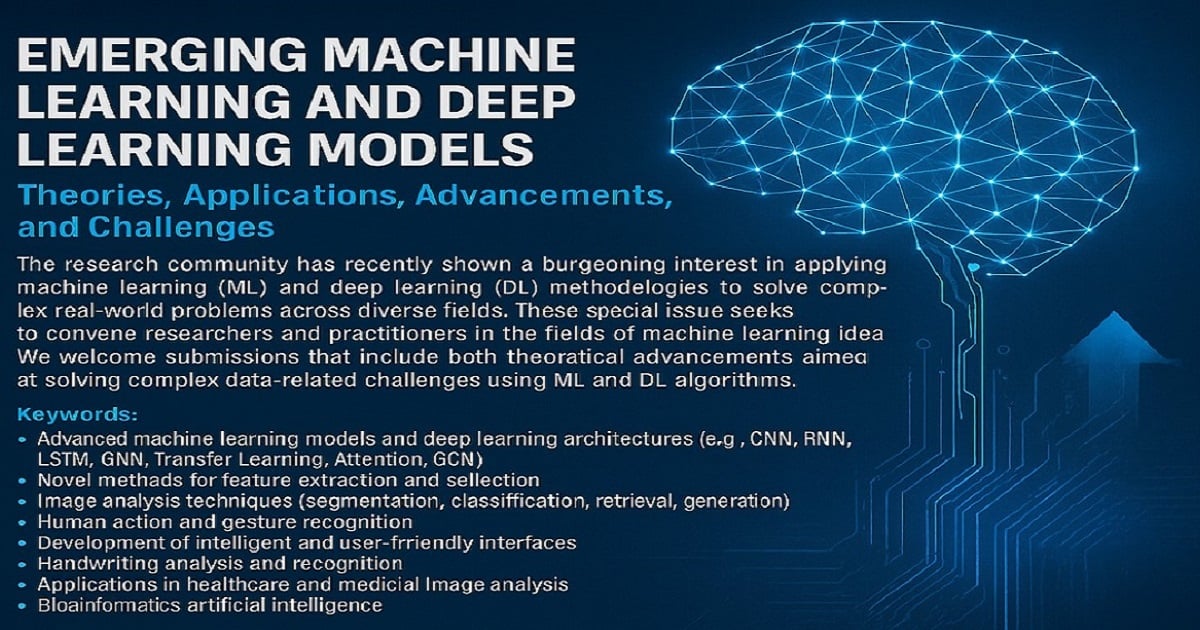- 2.6Impact Factor
- 6.1CiteScore
- 17 daysTime to First Decision
Next-Generation Machine Learning and Deep Learning Models for Complex Data, Vision, and Intelligent Applications
This special issue belongs to the section “Computer Science & Engineering“.
Special Issue Information
Dear Colleagues,
The research community has shown a burgeoning interest in applying machine learning (ML) and deep learning (DL) methodologies to solve complex real-world problems across diverse fields. These advancements in machine learning continuously present new challenges and innovative solutions for a variety of intricate issues in applications, technologies, and theoretical constructs. Deep learning, a critical subset of machine learning, focuses on learning hierarchical representations of input data via multiple non-linear layers. In recent years, DL techniques have seen widespread application, achieving remarkable success across various domains.
In this Special Issue, we invite researchers and practitioners in the fields of machine learning and deep learning to disseminate their original and innovative ideas. We welcome submissions that include both theoretical advancements and practical applications aimed at solving complex data-related challenges using ML and DL algorithms. Topics of interest for this collection include, but are not limited to, the following:
- Advanced machine learning models and deep learning architectures (e.g., CNN, RNN, LSTM, GNN, Transfer Learning, Attention, and GCN);
- Novel methods for feature extraction and selection;
- Image analysis techniques (segmentation, classification, retrieval, and generation);
- Human action and gesture recognition;
- Development of intelligent and user-friendly interfaces;
- Handwriting analysis and recognition;
- Applications in healthcare and medical image analysis;
- Bioinformatics and computer vision;
- Explainable artificial intelligence (XAI).
Dr. Yoichi Tomioka
Guest Editor
Manuscript Submission Information
Manuscripts should be submitted online at www.mdpi.com by registering and logging in to this website. Once you are registered, click here to go to the submission form. Manuscripts can be submitted until the deadline. All submissions that pass pre-check are peer-reviewed. Accepted papers will be published continuously in the journal (as soon as accepted) and will be listed together on the special issue website. Research articles, review articles as well as short communications are invited. For planned papers, a title and short abstract (about 250 words) can be sent to the Editorial Office for assessment.
Submitted manuscripts should not have been published previously, nor be under consideration for publication elsewhere (except conference proceedings papers). All manuscripts are thoroughly refereed through a single-blind peer-review process. A guide for authors and other relevant information for submission of manuscripts is available on the Instructions for Authors page. Electronics is an international peer-reviewed open access semimonthly journal published by MDPI.
Please visit the Instructions for Authors page before submitting a manuscript. The Article Processing Charge (APC) for publication in this open access journal is 2400 CHF (Swiss Francs). Submitted papers should be well formatted and use good English. Authors may use MDPI's English editing service prior to publication or during author revisions.
Keywords
- machine learning (ML)
- deep learning (DL)
- computer vision
- image segmentation
- feature extraction
- explainable AI (XAI)

Benefits of Publishing in a Special Issue
- Ease of navigation: Grouping papers by topic helps scholars navigate broad scope journals more efficiently.
- Greater discoverability: Special Issues support the reach and impact of scientific research. Articles in Special Issues are more discoverable and cited more frequently.
- Expansion of research network: Special Issues facilitate connections among authors, fostering scientific collaborations.
- External promotion: Articles in Special Issues are often promoted through the journal's social media, increasing their visibility.
- Reprint: MDPI Books provides the opportunity to republish successful Special Issues in book format, both online and in print.


